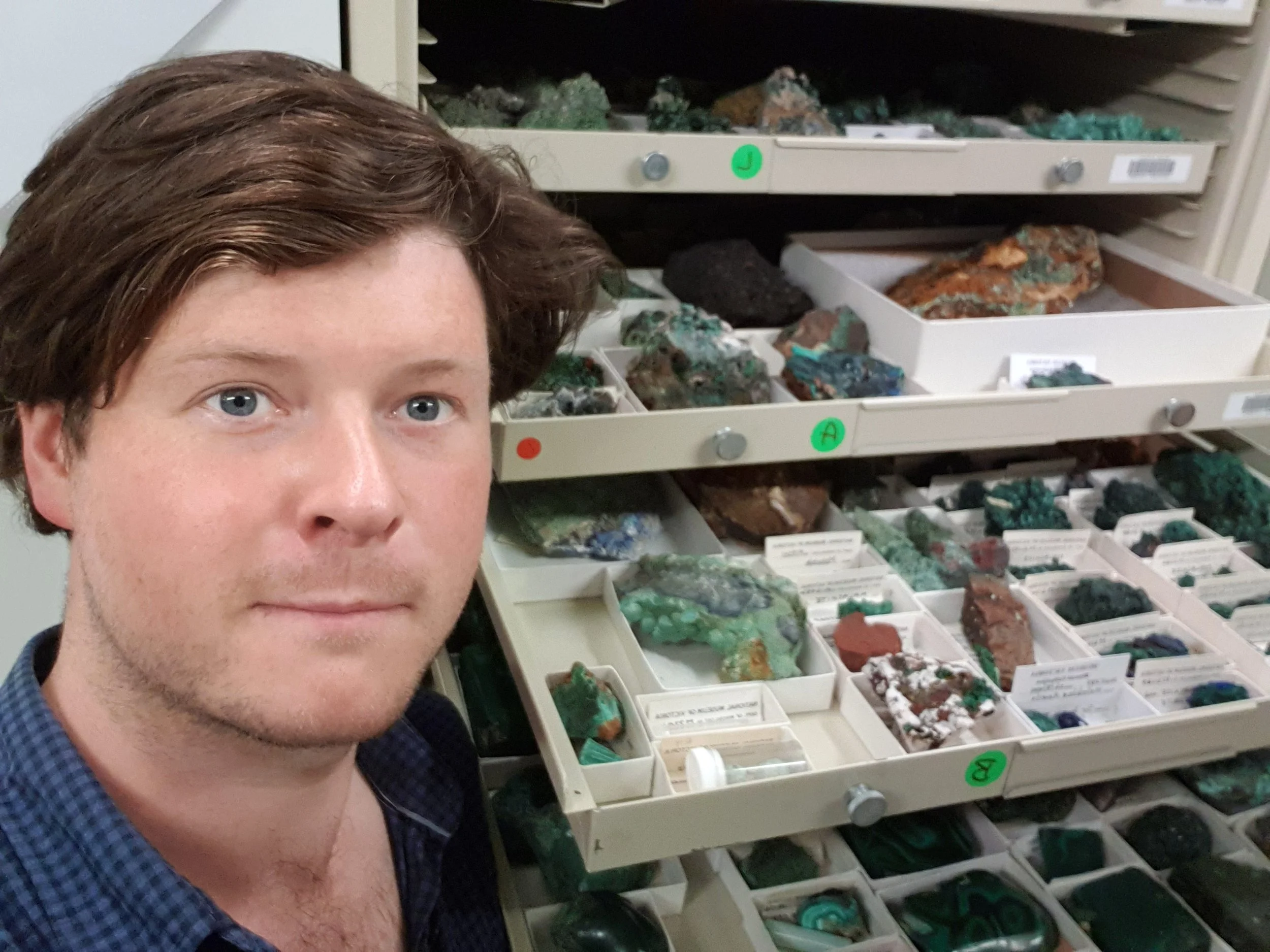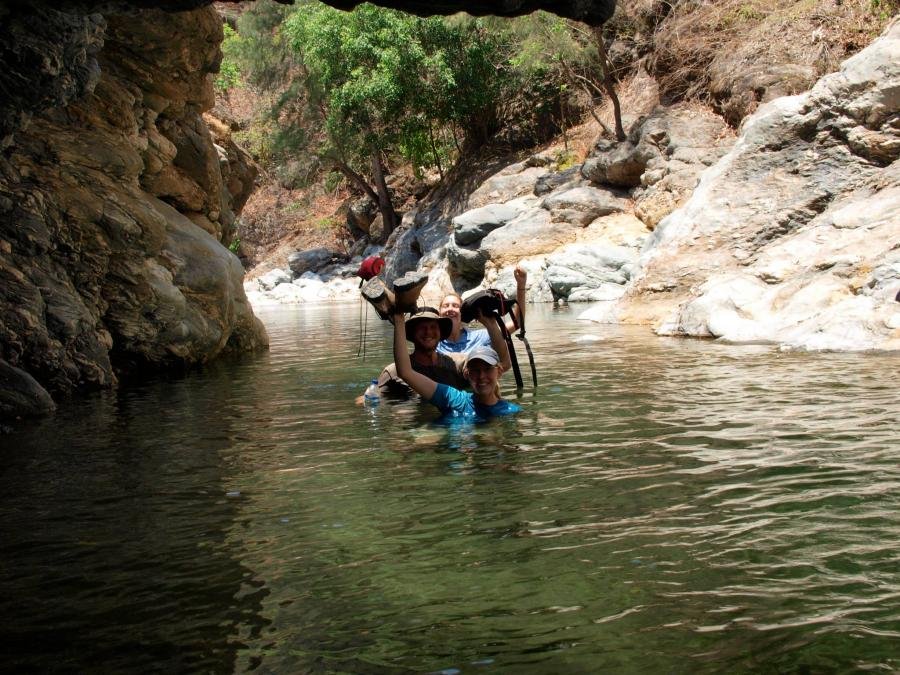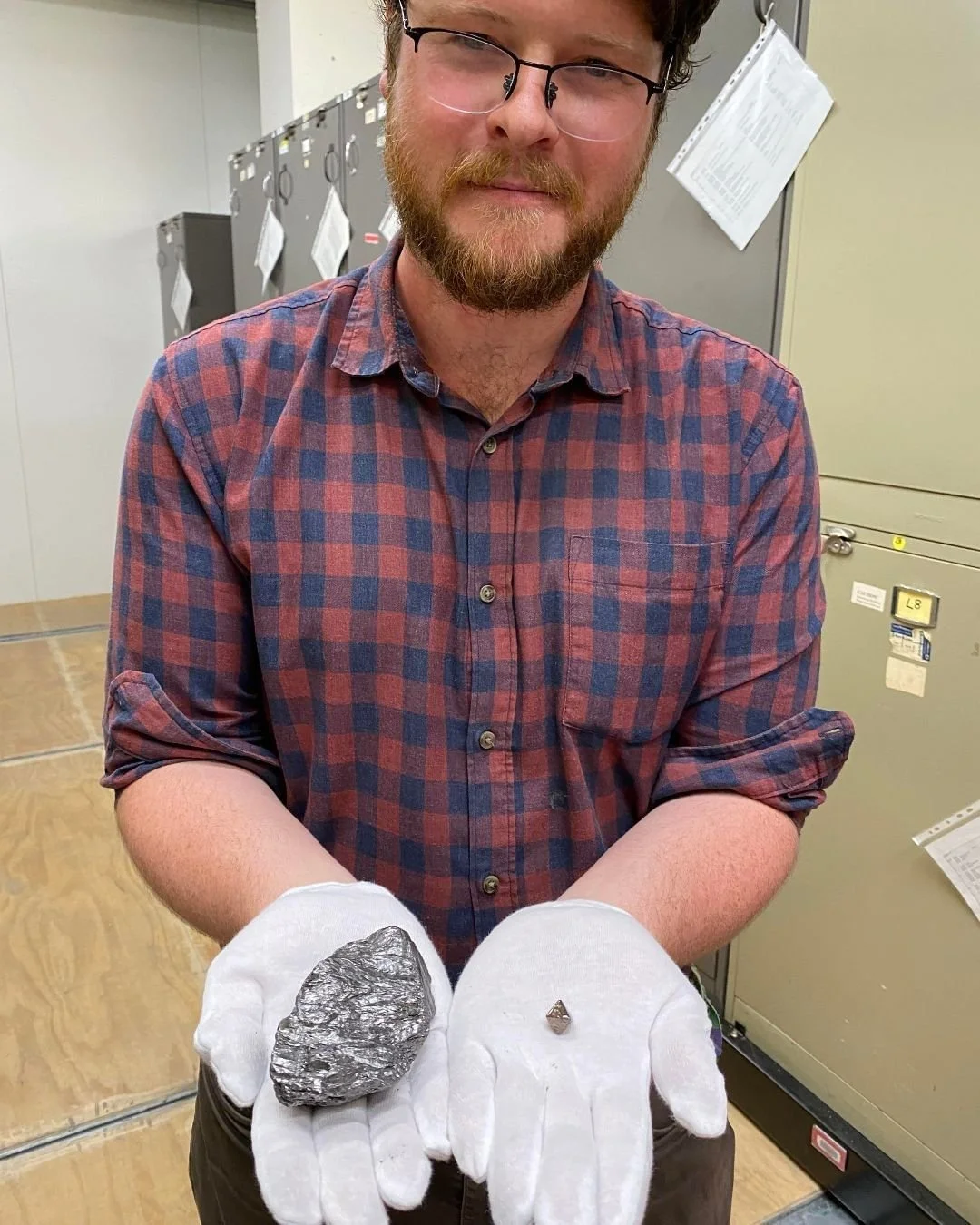
Oskar Lindenmayer
Collection Manager, Geosciences - Museums Victoria
Bachelor of Science (Earth Sciences) & Master of Science (Geology)
November 2021
Oskar with a well-organised cabinet of malachite specimens from around the world.
Oskar Lindenmayer is Collection Manager of the Geosciences collection at Museums Victoria. He cares for, organises and makes accessible Victoria’s State collections of rocks, minerals, meteorites, tektites and gemstones.
Oskar physically organises around 100,000 specimens, sources and catalogues new additions to the collections, manages digital data relating to the specimens, receives and processes requests for use of the collections (usually for research or exhibitions), and provides ideas, narratives, and information relating to geosciences and/or the collections for the Museum’s public programs and exhibitions.
The trials of getting to the next outcrop! Oskar and his colleagues fording a stream during Masters fieldwork in Timor-Leste.
Why did you choose this career pathway?
What are the benefits/negatives?
I was fortunate that an opportunity at Museums Victoria came up at a time when I was searching for work. I had previously worked in the mining industry and with another large collection of geological samples with a mining industry focus. I hadn’t ever considered a career in a museum, perhaps because opportunities are quite rare. In hindsight though, the mixture of science, logistics, history, data management, and science communication that museum work offers is the perfect environment for my skills and interests.
Difficulty ‘breaking in’ is certainly a significant downside to the field I now work in; there aren’t many positions and once people are in them they tend to stay for a long time. A benefit of this can be that once you have broken in you are likely to be able to develop skills and knowledge over time in a way that might not be possible in fields where shorter term roles are the norm. I am continuing to build on specialised skills such as object handling, database management, identification of rare minerals, gemmology, and archiving, as well as specific knowledge of the collections I look after and their history.
Oskar demonstrating some of the mineral polymorphs of carbon, graphite and diamond, in celebration of the international year of the periodic table (2019 if you missed it!).
What are the best parts about your job? What are the hardest parts?
The best parts of my job would have to be the variety of work and the amazing specimens I get to work with. One day I might be searching out examples of gold ores from the 1870’s with researchers in environmental chemistry, the next providing access to an ABC TV crew to film 4.6 billion year old meteorites, and the next identifying and cataloguing a donated collection of rare, microscopic phosphate minerals from Germany.
The hardest parts of my job are really the flip-side of this variety. I work in a small team with lots of projects going on, and we don’t always have the time and resources to do everything we’d like to. I’ve had to get good a prioritising what I think is going to be the most important work, and setting boundaries so that I don’t end up overwhelmed.
Oskar at the eastern edge of the Himalayas in Sichuan, China. Even a holiday can be a great opportunity to collect specimens for Victoria’s State collection!
How did you get to your current role?
My current role was advertised publicly, and a friend and colleague who had previously worked with the Museum sent the ad to me. She also acted as a personal referee for my application. Several of the career opportunities I’ve had have come to me because people I know thought I would be well suited to a role. Of course, you have to be able to back this up with practical skills and knowledge, particularly if you’re hoping to work in a scientific field; during the interview for my current role I was given a series of rock and mineral specimens to identify on the spot!
I think there can be a tendency amongst some scientifically minded people (and 10 years ago I would have been amongst them) to think of networking as something for the highly social, or corporate-types trying to get ahead. But if you’re genuinely interested and passionate about the field you hope to work in, seeking out and forming connections with those who share your enthusiasm is enjoyable whether or not it eventuates in a job.
Carbonate display at Museum Victoria. Source: Museums Victoria website. Photo credit: Rodney Start
How well did your degree prepare you for your career path?
The skills that I gained during my degrees that I use most often are writing, and searching and reviewing scientific literature. As a rule of thumb, we are always aiming for the collections and our work with them to be useful and accessible for the next 100 years. This makes documenting what we do (whether in the form of internal records or publications) a vital part my work.
The diversity of the collections and their uses means that I end up engaging with and contributing to projects that span many of the sub-disciplines of geosciences, from geomorphology to crystallography. While the strong foundational knowledge I gained during my studies is useful, I have found the skills I developed in seeking out and finding new information to be even more important. When presenting information to the public, it is particularly important to verify or quantify information based on the latest literature. Scientific understandings of Earth processes are constantly being refined and museums have to keep up!
Historical and modern record keeping for the collection: one of the early mineral registers dating to the 1880’s and its modern equivalent; the digital database.
What were your career worries and expectations when you were at uni?
When I decided to study geology I didn’t really have any expectations of what my career might look like. My philosophy was always to make the most of the opportunity to follow my passions and interests while studying (an opportunity that can be hard to find elsewhere). While I stand by this in principle, I think I would have benefited if I had spent more time during my studies planning and working towards where I wanted to end up.
Participating in or volunteering with special interest groups would have fostered more opportunities to meet people doing the kinds of things I wanted to do. Some examples that I am now involved with include the Geological Society of Australia, the Royal Society of Victoria, the Mineralogical Society of Victoria and the Field Naturalists Club of Victoria. I had a period of significant underemployment following completing my second degree that might have been shorter and certainly would have been more enjoyable if I had put more effort into building and maintaining these connections and communities earlier on.





